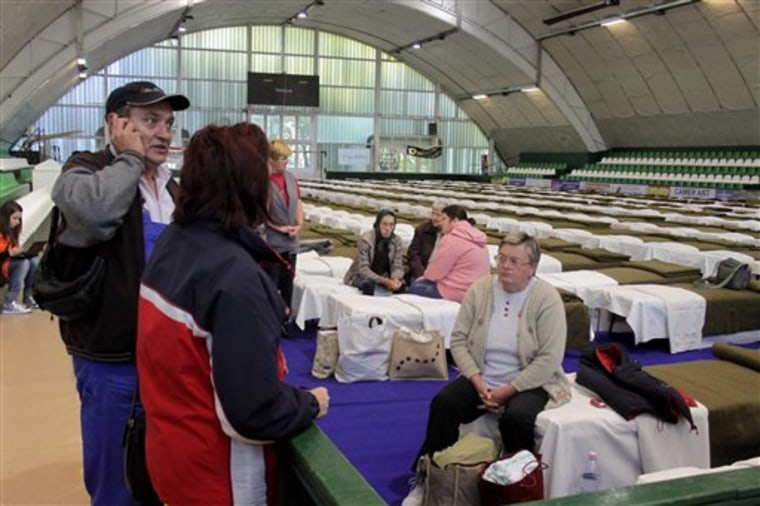The disaster that buried three Hungarian villages in caustic red sludge this week is deepening the gloom of a country gripped by recession, polarization and the near-ubiquitous feeling that its people are doomed to be victims of calamity.
Gyoergy Hoffmann, a coal miner in Ajka, a city near the spill, called it "just the latest stroke of fate" for a country dominated for centuries by foreign powers — first the Turks, then the Austrians and finally the Soviets, who turned the country into the communist bloc's main producer of alumina.
For decades, Hungary made the aluminum ingredient and shipped it to Russia, which sold the metal back to Hungary and other Soviet bloc nations at world market prices.
Swept by euphoria and national unity after the collapse of communism, Hungary considered itself ahead of its neighbors in cleaning up the environmental sins of the Soviet era. Rusting, polluted factories and abandoned garbage dumps, once common along Hungary's back roads, have become a rare sight.
But alumina plants remained active, including the factory outside the village of Kolontar, where the rupture of a wall holding waste sludge dumped up to 184 million gallons (700,000 cubic meters) of highly polluted water and mud onto three villages in about an hour Monday. At least seven people were killed by the caustic muck and hundreds were injured.
Hungary's prime minister said Saturday that the cracking wall of the reservoir could collapse at any moment and send a new wave of caustic red sludge into the devastated towns.
Environmental groups, meanwhile, are warning of other potential disasters, among them seven storage ponds about 60 miles (of Budapest that hold 12 million tons of sludge accumulated since 1945 — more than 10 times the amount that spilled this week.
"If the gates break there, much of Hungary's drinking water would be endangered," says WWF official Martin Geiger.
'Too many national cataclysms'
Such worries add to the burdens of a people whose national psyche has been formed by centuries of foreign domination, internal turmoil and economic hardships.
"There have been too many national cataclysms for Hungarians to be able to overcome their pessimism," says sociology professor Antal Bohm. "This catastrophe is simply one more in the series."
Some of the recent gloom is understandable. Hungary's economy contracted by almost 7 percent last year and the country has been forced to draw on about two thirds of a lifeline of 20 billion euros — nearly $28 billion — thrown by EU, the International Monetary Fund and the World Bank two years ago.
Nearly 2 million people are groaning under growing debt as the strong Swiss franc makes their loans in that currency insupportable.
Hungarian households' foreign currency loans equaled 26.2 billion euros — $36.46 billion at the end of June, with nearly 80 percent in Swiss francs, says the National Bank of Hungary. Of the 1.8 million people with such loans, 400,000 are behind on their payments — with 100,000 in arrears by three months or more.
With the hard times comes the need to find scapegoats, allowing the far-right Jobbik party to emerge third-strongest in April national elections after a campaign tinged with anti-Semitic and anti-Gypsy rhetoric and marches by a black-uniformed militia founded by its leader.
Those militia have been banned. But a party ad referring to "Gypsy criminals" was aired on state radio and television before recent municipal elections.
The ad also described corrupt politicians, banks and multinational companies as "parasites" sucking on the country's blood — language used by the Nazis to describe Jews.
Bohm, the sociologist, puts those facing poverty at around 30 to 40 percent of the population, adding: "This isn't a situation they imagined they'd be in 20 years after the change of system."
The gloom probably contributes to the EU's second-highest suicide rate, after Lithuania — more than 21 out of every 100,000 people in 2007, according to EU statistics.
Among the more famous suicide victims is Rezsoe Seress. The composer of "Gloomy Sunday," one of Hungary's most popular ballads of all time that premiered in the 1930s, killed himself in 1968.
"Little white flowers won't wait for you, not where the black coach of sorrow has taken you," the song goes. "Angels have no thought of ever returning you, would they be angry if I thought of joining you?"
Even the national anthem is downbeat. Adapted in the 19th century from a poem bearing the subtitle "From the rough centuries of the Hungarian people," it pleads to God to pity a people "long by waves of danger tossed."
No wonder "Hungarians always see their glass as half empty," Bohm said.
Asked how Hungarians see themselves, he responds: "Constant losers."
___
Associated Press Writer Pablo Gorondi contributed to this report.
